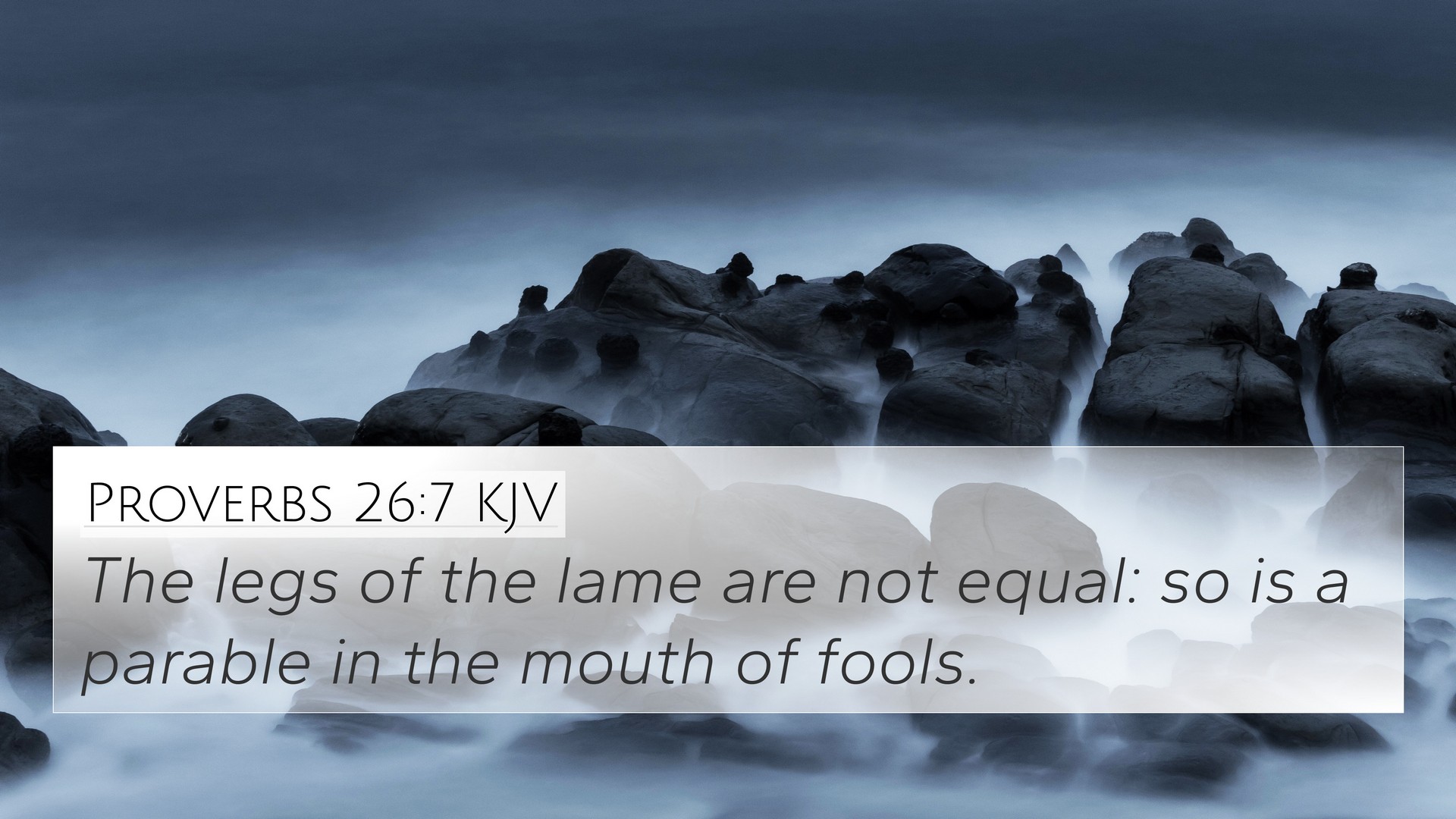Understanding Proverbs 26:7
Proverbs 26:7 states: "The legs of the lame are not equal: so is a parable in the mouth of fools." This verse employs a vivid metaphor to convey a deeper truth about wisdom, understanding, and discernment in communication.
Verse Meaning and Interpretation
This verse highlights the idea that just as the legs of a lame person are not capable of equal function, so too are the words of foolish individuals lacking in power and clarity. The metaphor suggests that the use of parables or complex sayings by those who lack understanding—or the "fools"—is ineffective and can lead to confusion.
Insights from Commentaries
-
Matthew Henry:
Henry notes that a parable is only beneficial when delivered by someone who has the insight and wisdom to interpret it correctly. The foolishness of those who misuse parables renders their words meaningless, akin to how the lame are unable to walk properly.
-
Albert Barnes:
Barnes elaborates that the verse reflects the ineffectuality of foolish speech. Just like a lame person's legs cannot function effectively, foolish people misunderstand or misapply wisdom, thus failing to convey it appropriately to others.
-
Adam Clarke:
Clarke emphasizes that the message within a parable can only be understood when taken seriously. In the hands of the foolish, it becomes a confusing and baffling thing, illustrating that wisdom requires a foundation of understanding.
Bible Verse Cross-References
Proverbs 26:7 can be cross-referenced with the following verses for a deeper understanding:
- Proverbs 1:7 - "The fear of the LORD is the beginning of knowledge: but fools despise wisdom and instruction."
- Proverbs 10:13 - "In the lips of him that hath understanding wisdom is found: but a rod is for the back of him that is void of understanding."
- Proverbs 18:2 - "A fool hath no delight in understanding, but that his heart may discover itself."
- Matthew 7:6 - "Give not that which is holy unto the dogs, neither cast ye your pearls before swine, lest they trample them under their feet, and turn again and rend you."
- 1 Corinthians 1:27 - "But God hath chosen the foolish things of the world to confound the wise; and God hath chosen the weak things of the world to confound the things which are mighty."
- Ecclesiastes 10:12 - "The words of a wise man's mouth are gracious; but the lips of a fool will swallow up himself."
- Proverbs 23:9 - "Speak not in the ears of a fool: for he will despise the wisdom of thy words."
Thematic Connections
The cultural context and thematic elements in Proverbs 26:7 resonate deeply with the principles of wisdom found throughout the Bible. The use of parables, the role of understanding, and the characteristics of foolishness all play significant roles in Biblical wisdom literature.
The Role of Wisdom in Communication
This verse challenges readers to discern the quality of speech they engage with and reflects on how wisdom is crucial when addressing complex truths through illustrative language.
Inter-Biblical Dialogue
Through cross-referencing with other scriptures, one can develop a comprehensive understanding of how the themes in Proverbs resonate throughout Biblical texts.
Conclusion
Proverbs 26:7 invites us to reflect on the wisdom of our words and the importance of proper understanding when conveying truths. The cross-references provided enrich our study, allowing for a comprehensive analysis of wisdom in the scriptures.
Additional Tools for Cross-Referencing
For those interested in how to effectively engage in cross-referencing Biblical texts, consider utilizing:
- Bible concordance to explore themes and connections.
- Bible cross-reference guides that align similar scriptures.
- Tools for Bible cross-referencing for in-depth study.
- Comprehensive Bible cross-reference materials for sermon preparation and personal study.
Final Thoughts on Cross-Referencing
Understanding Proverbs 26:7 requires careful consideration of the relationships between different Bible verses, which can enhance our comprehension of wisdom, folly, and the nuances of speech. Engage with these texts to foster a deeper understanding of God’s wisdom as revealed in Scripture.








